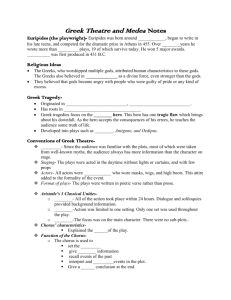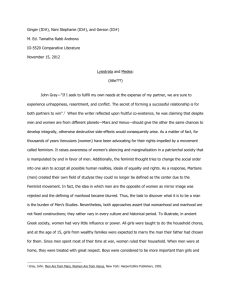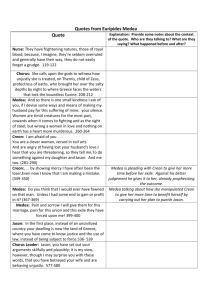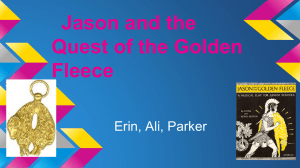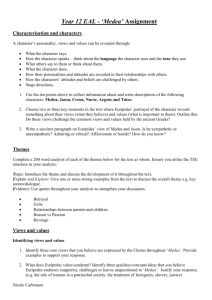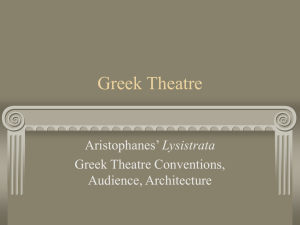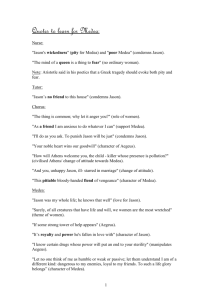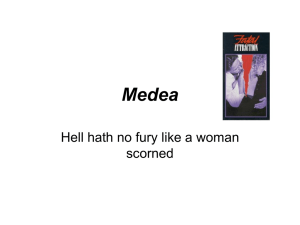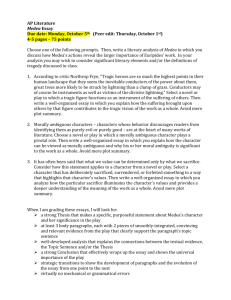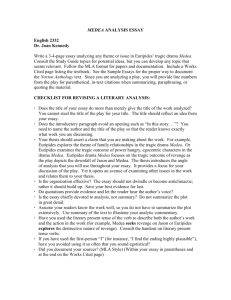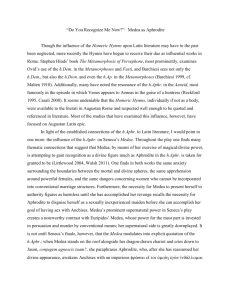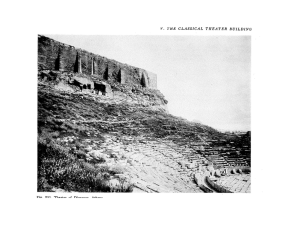Theatre History Midterm Greek Theatre (worth 120
advertisement
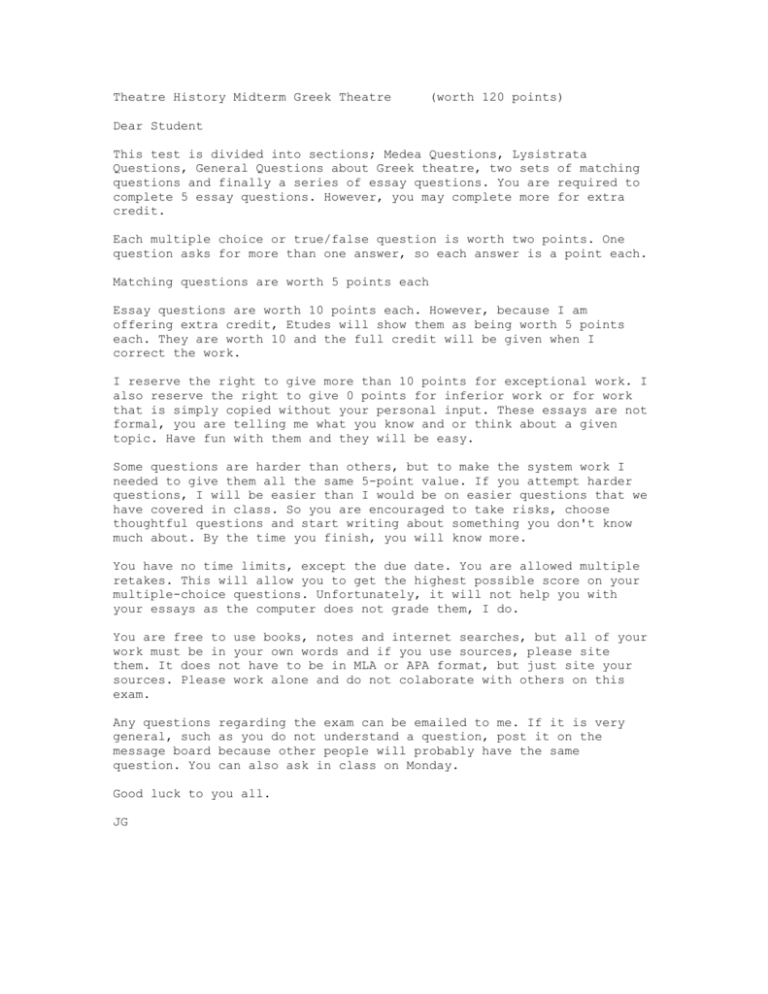
Theatre History Midterm Greek Theatre (worth 120 points) Dear Student This test is divided into sections; Medea Questions, Lysistrata Questions, General Questions about Greek theatre, two sets of matching questions and finally a series of essay questions. You are required to complete 5 essay questions. However, you may complete more for extra credit. Each multiple choice or true/false question is worth two points. One question asks for more than one answer, so each answer is a point each. Matching questions are worth 5 points each Essay questions are worth 10 points each. However, because I am offering extra credit, Etudes will show them as being worth 5 points each. They are worth 10 and the full credit will be given when I correct the work. I reserve the right to give more than 10 points for exceptional work. I also reserve the right to give 0 points for inferior work or for work that is simply copied without your personal input. These essays are not formal, you are telling me what you know and or think about a given topic. Have fun with them and they will be easy. Some questions are harder than others, but to make the system work I needed to give them all the same 5-point value. If you attempt harder questions, I will be easier than I would be on easier questions that we have covered in class. So you are encouraged to take risks, choose thoughtful questions and start writing about something you don't know much about. By the time you finish, you will know more. You have no time limits, except the due date. You are allowed multiple retakes. This will allow you to get the highest possible score on your multiple-choice questions. Unfortunately, it will not help you with your essays as the computer does not grade them, I do. You are free to use books, notes and internet searches, but all of your work must be in your own words and if you use sources, please site them. It does not have to be in MLA or APA format, but just site your sources. Please work alone and do not colaborate with others on this exam. Any questions general, such message board question. You regarding the exam can be emailed to me. If it is very as you do not understand a question, post it on the because other people will probably have the same can also ask in class on Monday. Good luck to you all. JG Part 1 of 5 Medea (worth 20 points) 1. Medea is about a Greek woman who is unfairly treated by the Gods True or False 2. Jason immediately became King after he married Creon's daughter. True or False 3. By Creon's orders, Medea is sentenced to A. Death B. Banishment from Cornith C. Banishment from Greece D. Giving up her two children to Jason and his new wife 4. In the play Medea, Aegeus offers Medea A. one day more in the city B. help with taking revenge on Jason C. a promise of safe refuge D. to take the children with him to his palace. 5. The action in Medea takes place over a longer time period than most Greek tragedies covering two days. True or False 6. The play Medea ends with Medea A. being chased out of the city by an angry mob B. escaping in a chariot drawn by dragons C. making a final violent attempt on Jason's life D. escaping to Thebes 7. As a consequence of Medea's plan A. Creon and his daughter dies B. Jason dies C. the Messenger is killed D. Aegus and his daughter die E. Jason's daughters die 8.Medea plans on taking revenge on Jason by (choose all that apply, more than one answer is possible) A. Poisoning the food at the banquet B. Killing the bride with a poisoned robe or gown C. killing Jason's sons D. casting an evil spell on Jason's bride E. leaving the city with Jason's sons and living in Thebes. 9. Euripides is most often criticised as a dramatist for A. Supporting the male point of view in every play B. Making fun of people who are not Athenian C. Writing a play about a foreigner D. using deus ex machina (God of the machine) to provide improbable conclusions to his plays E. Writing a play about a woman 10. Medea reveals how she will take revenge on Jason to the chorus (and the audience) immediately following the scene between Medea and.. A. Creon B. Jason C. her children D. Aegeus E. the messenger PART 2 OF 5 LYSISTRATA (WORTH 20 POINTS) THE FOLLOWING QUESTIONS ARE ABOUT LYSISTRATA 11. How does Lysistrata propose the women will be able to make the men declare peace? A. The women will refuse to cook until war ends B. Abstinence for a month C. Abstinence until peace is declared D. By killing their children 12. A chorus of young women take over the Akropolis. True or False 13. When by A. B. him C. out D. Myrrhine's husband arrives, she torments him doing a striptease making out like she is going to have sex with but doesn't hiding in the Acropolis and refuses to come talking in a very high voice 14. When the women make their oath, they decided to make a sacrifice. What do they sacrifice? A. A bull B. A sheep C. A white horse D. A big jug of wine 15. Who is from Sparta? A. Kinesias B. Kalonike C. Myrrhine D. Lampito E. Lysistrata 16. Who is Lysistrata's neighbor? A. Kinesias B. Kalonike C. Lampito D. Myrrhine E. Antigone 17. Who's the man? A. Kinesias B. Kalonike C. Myrrhine D. Lampito E. Ismenia 18. Why does Lysistrata bring out "Reconciliation"?(or in some editions of the play "Peace") A. She gives "Reconciliation" to the Spartan ambassador B. "Reconciliation" tells the men why they should agree to peace. C. "Reconciliation" shows the men how to divide up Greece in fair and equal parts D. "Reconciliation" creates greater urgency in the men to agree to peace. Review Check to review before finishing (will be flagged in Table of Contents) 19. The differences between the way Lysistrata and Lampito speak betray A. Spartan attitudes toward Thebes. Thebians are dim wits. B. Athenian attitudes toward Sparta. Athenians are elegant and have sharp wits. Spartans are not very bright and a bit crude. C. the positive relationships between women in Athens and Sparta, they are both very intelligent. D. all the women speak the same which highlights how Aristophanes felt all women were equal and should be respected despite being from different states. E. Spartan superiority over Athens, foreshadowing the eventual Athenian defeat of Sparta. 20. Speaking with the Commissioner, Lysistrata compares the Athenian master plan with A. cleaning smelly socks B. spinning wool C. bad sex D. washing the dishes E. keeping an eye on young children Part 3 of 5 General Questions about Greek Theatre (worth 20 points) 21. Orchestra comes from the Greek and means the A. Hearing place B. Music place C. Dancing place D. Seeing place 22. Which god or goddess is most closely associated with Greek Drama. A. B. C. D. Dionysus Athena Zeus Oedipus 23. Who is commonly credited with being the first tragedy writer who changed the form by stepping out of the chorus and taking a solo part. With this act, he is also credited with being the first actor in Western theatre. A. Thespis B. Socrates C. Homer D. Aristotle 24. An Ode is a dignified three part song sung by the protagonist in Greek drama. True or false. 25. Dithyramb is A. an Ancient Greek choral hymn sung and danced to honor Dionysus B. the playwright's choice of words or the match between language and subject matter. C. a Greek God D. Aristotle's word for plot 26. The parts of an Ode include all of the following EXCEPT A. Strophe B. Antistrophe C. Interlude D. Epode 27. The skene in Greek Theatre was A. the "speaker" or the narrator in Greek plays B. the "Seat" or the place for the audience C. the building directly behind the stage used to raise characters and provided a place for actors to get changed and provided a background that often represented a palace or home. D. the place where the actors danced 28. Theatron A. the B. the C. the D. the 29. What Oedipus? A. B. C. D. E. F. means seeing place sitting place actor's place listening place happens to Oedipus at the end of the play he blinds himself he is no longer king his wife kills herself he asks Kreon to care for his children All of the above Only A, B and D 30. What is mechane? A. The Greek word for imitation. Aristotle believe this gave people pleasure B. A Greek treat, often served with olives and served at the theatre C. What the masks were made from. D. The Greek for machine. Cranes were used back stage to lift actors who often represented Gods, hence he expression deus ex machina 31. Make a match - Match Aristotle's Six Elements with their definitions Match Choice 1. Everything you can see on stage 2. The most important of Aristotle's A. Plot six elements B. Music 3. the agent for the action, C. Character 4. everything you can hear on stage D. Spectacle 5. the selection of words and the order they are put in 6. E. Diction the universal truth that we can learn from the play F. Thought or meaning Match the lettered area of the Theatre Epidaurus with the appropriate term Theatron, Parados, Mechane, Skene, Paraskene, Orchestra 32. . A. C. E. picture Part 5 of 5 B. D. F. ________ is not shown in this Short answer/essay (worth 50 points) You must answer five of the following questions. You are encouraged to answer more than 5 for extra credit. I reserve the right to award more than 10 points for exceptional work and to give 0's to work of poor quality. Some questions are harder than others, and that will be considered when I grade work. You are allowed to used resources such as your book, notes and Internet searches, however put responses in your own words and site any sources. It does not have to be in MLA or APA format. You can write your essays in Word and paste in your work. If you do, you must use the Paste from Word button, otherwise your work will be filled with HTML code and I will not be able to read it. This button has a little clipboard with a blue W (like the symbol for MS Work. Alternatively, you can save the work as a text file and paste from that document. Good Luck. 33. According to Aristotle, a tragic hero should * be of noble birth * be initially neither more good or evil than normal people * meet their fate due to some "tragic flaw" which is usually an error in judgment * have a common tragic flaw, usually "hubris" or excessive pride, which leads to their downfall * make a discovery or "learn a lesson" usually as a result of their downfall (Creon in Antigone for example) * face a turn in fortune * face an inescapable fate (Oedipus with the oracle) * A final quality is that through watching the tragic hero, the audience should experience catharsis. They pity the hero and they fear facing a similar fate. Through watching the tragedy, the audience learns a lesson and fear and pity is purged, resulting in a cathartic experience. Aristotle considered Oedipus a perfect example of a tragic hero. Using Aristotle's qualities of a tragic hero, identify who is the tragic hero of Medea and why. Or you may wish to argue there is no tragic hero is Medea and you will explain why. You will not be docked for your opinion but you will lose point for not fully explaining and supporting your answer. 34. Imagine you are a Cornith lawyer you have a choice of representing Medea or Jason in a court battle after the events of the play have happened. To help you decide, summarize Medea's argument against Jason below and attempt to justify why she did what she did. Then summarize Jason's argument. Chose who you think has he best case. Which case would you choose and why? Briefly write out both sides of the case and summarize at the end who has the strongest case and who you will represent and why? (You wish to not chose the one with the strongest case, it is up to you) Questions to consider: Was Medea driven to do what she did? Or do her actions outweigh any harm that Jason may have caused? Is the love of a child more sacred than the vows between husband and wife? Was Medea poorly treated because she was a woman? A foreigner? Because she was getting a little old? Explore and discuss. 35. Describe in detail a whole production cycle for the City Dionysus from the end of the previous year's festival to about two weeks after the festival you are planning. Include: Who and what will be performed on each of the five days How the plays will be selected Explain aspects of the rehearsal process for the tragedies or the comedies 36. From the essay "Women's Parts Played by Men in the Roman Theatre" by Goethe and "The Legacy of Goethe's Mimetic Stance" summarize some of arguments in support of "Goethe's basic premise-that in performance men make better women" Include Goethe's arguments but also include some other arguments from Cocteau and Jarry provided in the second essay. Do you believe Goethe's argument has some validity in the theatre? Why or why not? Lesley Ferris argues that this is an enduring example of women hating in the theatre. Do you agree with this? Why or why not? 37. You are on vacation with a friend visiting Ancient Greek Theatres. Your these seats in the front row that are the rest of the seats in the theatre. everything you could tell your friend and why they are different. in Greece friend notices different from Write below about these seats 38. You get a summer job at a museum. A tourist comes to you and asks you to explain something about this image. Based on your theatre history knowledge, write down all the things you could tell them. What kind of actor are they (Tragic, Comic) and what clues are there to indicate this? What role might they have had in the play? Tell them about his costume and what it means. Try to give as much detail as you can. 39. Discuss the comic elements in Lysistrata. What situations and relationships are inherently comic and why? 40. Using Lysistrata as a model, discuss the potential benefits and liabilities of using comedy for an antiwar play. 41. Explain aspects of stage design (scenic, costume, sound, lights) in Ancient Greece including Pinakes, Periakotoi, Ekkyklema and Mechane; the use of the skene and orchestra; light and sound, and any other aspects that helped with the design aspects of the production. (You may attach drawings to show your understanding and better illustrate your explanation. Remember, you are free to Google and do research for answering the question but please answer in your own words. 42. Describe and discuss the Ancient Greek's treatment of violent and aggressive acts in plays and on stage. Provide examples from at least three plays. Does the portrayal of violence differ in tragedy and comedy? How is violence presented on stage? (Though action, text, symbols, special effects) Are the Greek methods still relevant for theatre productions today? How would you stage these acts to a modern audience? Same? Different? Discuss
